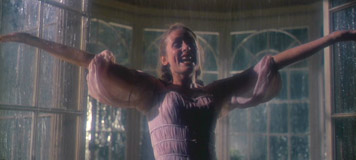
THE SOUND OF MUSIC (1965)
*½/**** Image B Sound B Extras B+
starring Julie Andrews, Christopher Plummer, Richard Haydn, Eleanor Parker
screenplay by Ernest Lehman
directed by Robert Wise
 THE KING AND I (1956)
THE KING AND I (1956)
****/**** Image A Sound A Extras A
starring Deborah Kerr, Yul Brynner, Rita Moreno, Martin Benson
screenplay by Ernest Lehman, based on Margaret Landon’s play “Anna and the King of Siam”
directed by Walter Lang
SOUTH PACIFIC (1958)
*½/**** Image A+ (Theatrical) A (Roadshow) Sound B Extras C+
starring Rossano Brazzi, Mitzi Gaynor, John Kerr, Ray Walston
screenplay by Paul Osborn, based on Tales of the South Pacific by James A. Michener
directed by Joshua Logan
CAROUSEL (1956)
**/**** Image A Sound A Extras C
starring Gordon MacRae, Shirley Jones, Cameron Mitchell, Barbara Ruick
screenplay by Phoebe and Henry Ephron, based on the Ferenc Molnár’s play “Liliom”
directed by Henry King
LILIOM (1934)
****/**** Image B Sound B Extras B+
starring Charles Boyer, Madeleine Ozeray, Robert Arnoux, Roland Toutain
screenplay by Robert Liebmann, dialogue by Bernard Zimmer, based on the play by Franz (a.k.a. Ferenc) Molnár
directed by Fritz Lang
STATE FAIR (1945)
½*/**** Image B- Sound B- Extras A
starring Jeanne Crain, Dana Andrews, Dick Haymes, Vivian Blaine
screenplay by Oscar Hammerstein II, based on the novel by Philip Strong
directed by Walter Lang
STATE FAIR (1962)
**/**** Image A Sound A Extras C
starring Pat Boone, Bobby Darin, Pamela Tiffin, Alice Faye
screenplay by Richard Breen; adaptation by Oscar Hammerstein II, Sonya Levien, Paul Green
directed by José Ferrer
OKLAHOMA! (1955)
***/**** Image A (CinemaScope) C (Todd-AO) Sound B+ Extras B-
starring Gordon MacRae, Gloria Grahame, Shirley Jones, Gene Nelson
screenplay by Sonya Levien and William Ludwig
directed by Fred Zinnemann
 by Walter Chaw God, The Sound of Music is so freakin’ nice. Nazis are the bad guys, no controversy there; raindrops on roses and whiskers on kittens–have you no heart, man? But when I like Rodgers & Hammerstein–and I like them quite a lot, truth be wrenched–I like their ambiguity, their irony, their goddamned fatalism in the face of eternal romantic verities. Consider the animal (jungle?) heat of “Shall We Dance,” cut off like a faucet by the fascistic abortion of The King and I‘s secondary love story; or the persistence of love despite abuse and abandonment in Carousel; or the slapdash kangaroo court that justifies love in Oklahoma!. This is all so much more than the slightly shady (and ultimately redeemed) shyster of The Music Man–this is reality in the midst of the un-, sur-, hyper-reality of the musical form. Yet what The Sound of Music offers up is a military man shtupping an ex-nun with no corresponding sense of fetishistic eroticism. How is it that the two most popular adult Halloween costumes engaged in naughty Alpine sexcapades could be totally free of va-va-va-voom? It’s so relentlessly wholesome that of course it’s the most beloved artifact of its kind in the short history of the movie musical: If you’re of a certain age, the plot of the thing is almost family mythology, resurrected every holiday like a dusty corpse at a decades-long Irish wake gone tragically awry. That ain’t a grin, baby, it’s a rictus.
by Walter Chaw God, The Sound of Music is so freakin’ nice. Nazis are the bad guys, no controversy there; raindrops on roses and whiskers on kittens–have you no heart, man? But when I like Rodgers & Hammerstein–and I like them quite a lot, truth be wrenched–I like their ambiguity, their irony, their goddamned fatalism in the face of eternal romantic verities. Consider the animal (jungle?) heat of “Shall We Dance,” cut off like a faucet by the fascistic abortion of The King and I‘s secondary love story; or the persistence of love despite abuse and abandonment in Carousel; or the slapdash kangaroo court that justifies love in Oklahoma!. This is all so much more than the slightly shady (and ultimately redeemed) shyster of The Music Man–this is reality in the midst of the un-, sur-, hyper-reality of the musical form. Yet what The Sound of Music offers up is a military man shtupping an ex-nun with no corresponding sense of fetishistic eroticism. How is it that the two most popular adult Halloween costumes engaged in naughty Alpine sexcapades could be totally free of va-va-va-voom? It’s so relentlessly wholesome that of course it’s the most beloved artifact of its kind in the short history of the movie musical: If you’re of a certain age, the plot of the thing is almost family mythology, resurrected every holiday like a dusty corpse at a decades-long Irish wake gone tragically awry. That ain’t a grin, baby, it’s a rictus.
by Travis Mackenzie Hoover Alain Resnais films are more interesting to me for their differences than for their similarities. Though you can find an oft-cited obsession with memory running through his oeuvre, the high-profile literary screenwriters with whom he chooses to collaborate tend to impose their own sensibilities. Thus Hiroshima, mon amour features Marguerite Duras' passive-aggressive desperation and Last Year at Marienbad is marked by Alain Robbe-Grillet's mathematical abstractions. Neither of those two canonical works–which are at least united by a conceptual monumentalism–looks very much like Muriel, or The Time of Return (Muriel ou le temps d'un retour) (hereafter Muriel, also its promotional title), which enlists Jean Cayrol to sketch a story of domestic dishonesty and historical trauma that's at once spatially smaller and more emotionally expansive. Here, if one isn't confronted with the ostentatious "artistry" of Resnais' more famous work (not that great artistry isn't evident), one is aware of a tangle of guilt and regret behind the brave faces. And whoever can be said to be in the driver's seat, it's an amazing film.

